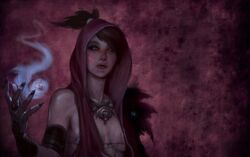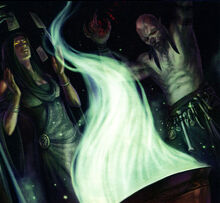Apostates are mages who are not part of the Circle of Magi and are thus considered "rebel mages."[1] There are two main types of apostates: hedge mages and general apostates, who were never part of the Circle, and rogue mages, who have fled from the Circle. The Templar Order is charged with finding apostates and either capturing or killing them. Maleficarum are a branch of apostate mages considered most dangerous.
Background

Morrigan, an apostate and Witch of the Wilds
Once, the term only described mages who willfully left the Circle and the path the Chantry had laid out for them. However, as the Andrastian Chantry is the dominant religion in Thedas, the Chantry assumes that everyone born in Thedas is a follower of that faith. Anyone who disobeys the laws of the Chantry is thus regarded as betraying their faith, and labeled apostate. The Chantry believes that apostates are at greater risk of being possessed by demons and becoming abominations.
This Chantry policy also includes the Dalish elven mages including the clan keepers who are however left alone as long as the clan remains isolated from the rest of the world. Although Saarebas are already controlled by the Qunari, the Chantry also treats them as apostates.
Mages within the Grey Wardens are technically apostates, but are granted reprieve from templar attention upon recruitment. The harboring of apostates—even blood magic practicing maleficarum—is a point of contention between the two orders, and is only tempered by its relative rarity, due to the Wardens' conservative recruitment standards. Nonetheless, the Wardens are expected to act appropriately if a mage grows beyond their control, else the templars consider the mage's immunity forfeit.
Witches of the Wilds constitute a separate group of apostates.
Hedge Magic
Hedge mages are untrained magic-users who wield powers developed outside of conventional teaching.[2] Often their magic may be harmless enough that they are not pursued by the Chantry.
More specifically hedge magic, known by its more technical name "arcanist derangement"[3] among mages and scholars, is a form of magical expression different than that of typical mages. The term was coined by Magister Allineas at the height of the Towers Age. The magister posited that magical talent is like a flowing river. When expressed through a mage, it finds a proper outlet through spellcraft. Left to its own devices it flows unexpectedly, and thus hedge mages are created. Prior to the creation of the Circles, such magical talent expressed itself often through ancient traditions and rituals. Those mages possessed power no Circle spell could replicate and their unpredictable ability was deemed a threat.
Hedge mages, according to Pharamond in Dragon Age: Asunder, live chaotic lives, able to commune with spirits, lured into darkness and temptation and sometimes even insanity. Their lives are often short as a result of this wild talent. The term "arcanist derangement" reflects this propensity toward madness in such mages.
The term "hedge mage" was created as a derogatory term by the Chantry.[4]
Maleficarum
- Main article: Maleficar
Maleficarum actively pursue dangerous and forbidden schools of magic, including blood magic.[5] Many apostates do not practice forbidden schools of magic, but the stigma is so intense that most apostates are looked upon as maleficar.
Notable apostates

Apostate mages[6]
- For a complete list, see [[::Category:Apostates]].
- Adain
- Aldenon
- Anders
- Baroness
- Bethany Hawke
- Caleth
- Ceridweth
- Connor Guerrin
- Feynriel
- Flemeth
- Hawke (if played as a mage)
- Jowan
- Lanaya
- Marethari
- Malcolm Hawke
- Merrill
- Morrigan
- Sketch
- Velanna
- Zathrian
Codex entries
![]() Codex entry: An Honest Answer Regarding Apostates
Codex entry: An Honest Answer Regarding Apostates
![]() Codex entry: Apostate's Courage
Codex entry: Apostate's Courage
References
| ||||||||||||||||||||

